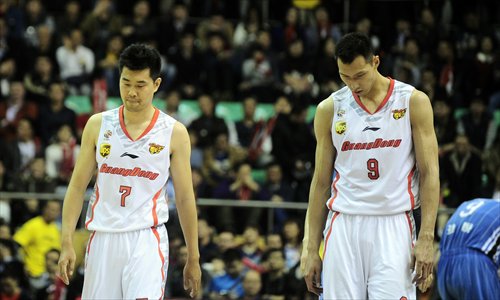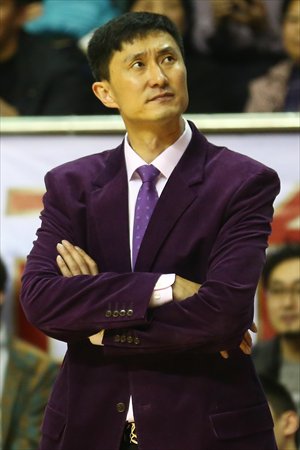HOME >> SPORTS
End of Guangdong’s reign
By Lu Wen'ao Source:Global Times Published: 2014-3-15 0:38:01

Wang Shipeng (left) and Yi Jianlian of the Guangdong South China Tigers react during their Thursday's CBA playoff semifinal against the Beijing Ducks in Dongguan. Photo: CFP
The CBA's eight-time champions, the Guangdong South China Tigers, have failed to grab a playoff final berth for the first time in 12 years after they were upset by the Beijing Ducks on Thursday.
Too much home pressure on his players ruined Guangdong's chances, coach Du Feng said after the game.
Du had pulled Guangdong back from the brink of elimination on Tuesday with an away win against Beijing to tie the series 2-2, which was the first time he gave instructions on the court in the playoffs after executive coach Jonas Kazlauskas' absence due to an ankle injury.
Guangdong lost the game against Beijing, who bagged a series-high 110 points in the last of their best-of-five semis.
Pundits and fans offered more reasons for Guangdong's slump.
Su Qun, editor-in-chief of Guangzhou-based Basketball Pioneers newspaper, said Guangdong had simply reached their peak.
"Things will develop in the opposite direction when they become extreme. When Guangdong claimed the championships last season, Shandong didn't offer enough of a challenge, then Guangdong didn't get fully prepared for tight battles," Su told the Global Times.
A failure to acknowledge their weak attacking also led to Guangdong's fall, Su said.
"They were overconfident in their attacking, a lack of recognition on their attacking problems ruined their final hope," Su added.

Du Feng Photo: IC
Foreign players' saga
Guangdong's decision to replace Khalif Wyatt with Royal Ivey was one of the decisions that puzzled fans.
"In CBA games, attacking is the top priority, Wyatt averaged 14.6 points in his 28 games, while Ivey only offered 10.1 points. I don't know why Liu Hongjiang chose to replace Wyatt," a basketball fan named He Dongxiang told the Global Times.
There has been widespread speculation that Liu, the team's manager, is set to resign after Thursday's calamity.
Ivey was brought in to improve Guangdong's defending, Liu revealed when signing him.
"He is experienced as he spent nine years playing in the NBA. We trust in him to improve the team," Liu said when unveiling Ivey in January.
But statistics show that Ivey fell far short of the team manager's expectations.
Stephon Marbury of the Ducks, Ivey's counterpart, nailed 33.2 points on average in the two sides' semifinal clashes.
In contrast, the Ducks hired Damien Wilkins as a "temporary" substitute for Marbury when the latter was recovering from a left knee injury during the regular season. Wilkins delivered 21.2 points on average in his 19 games for Beijing.
Slow generation shift
Luo Le, a sports commentator with Changsha-based Titan Sports newspaper, said the South China Tigers had failed to cultivate their rising stars at the right time.
"When Beijing defeated Guangdong in the 2012 finals, Guangdong didn't take the opportunity to bring in new blood, but invited Yi Jianlian back, and then relied heavily on him, which slowed down their home-grown players' progress," Luo told the Global Times.
Under the Lithuanian executive coach since 2013, Guangdong's young players had seen little court time in tight clashes.
One example is 19-year-old forward Gao Shang, who made his debut at the semis only when Du took full charge.
Kazlauskas, the former head coach of the Chinese national basketball team, relied too much on Guangdong's well-known players. Besides Yi, there were 31-year-old Wang Shipeng and Zhu Fangyu on his favorite list.
Those players' large amount of court time without doubt reduced the chances of other young players' improving, as some fans argued that Liu Xiaoyu and Chen Jianghua, the club's two internationals who have just turned 25, are far from what they expected to see.
"Guangdong are the club with the most Chinese internationals, but in the two years since they lost to Beijing in 2012, their young internationals, led by Liu Xiaoyu and Chen, haven't improved as much as I thought," a basketball fan named Zhou Ziran told the Global Times.
"By comparison, Liu Xiaoyu may do better than Chen, on account of Guangdong's foreign players' poor performances."
Some opposing ideas do exist. One fan named Mao Jiale said the young South China Tigers need to work harder on and off the court.
"Rather than the elder players stepping back to offer more time to young players, I think it should be the youths' hard work on and off the court that wins more court time over the aging players," Mao told the Global Times.
Fans pointed to Guangdong's neighbors, the Dongguan Leopards, who also got to the semifinals with nine of their 12-player lineup born after the 90s.
Despite being swept 3-0 by the Xinjiang Flying Tigers, Dongguan were hailed by fans for their young player policy.
Posted in: Feature, Basketball